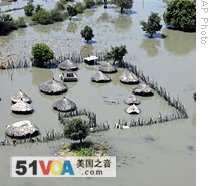Geneva
21 March 2009
 |
| A homestead and crops near the border town of Oshikango, Namibia, lay under flood waters in the northern part of the country, 18 Mar 2009 |
Namibia, normally a very dry country, has been pummeled with torrential rains for the past five weeks. The United Nations reports the scale of the disaster is huge.
It says the level of the Zambezi River has risen seven meters. Heights such as these have not been recorded since 1963.
Although the intensity of the rains has calmed, the rainy season is expected to continue for the next four weeks. Spokeswoman for the U.N. Office for the Coordination of Humanitarian Affairs, Elizabeth Byrs, tells VOA this could have dramatic consequences, especially for health.
"Those floods could trigger a malaria outbreak and all other water-borne diseases," she said. "There is stagnant water and the larvae developing in this type of water and it is of concern for the health of the population."
Byrs says the water and sanitation system has broken down and there are fears that flooding in the north could lead to a further spread of cholera.
A few days ago, the President of Namibia declared an emergency for the north-central and northeastern parts of Namibia and appealed for international assistance.
She says an inter-agency team, which recently visited the Cuvelai region in Northern Namibia bordering Angola, has returned with a list of priority needs.
"Water-sanitation, of course, food because most of the crops have been damaged and, of course, shelter for the people who have been evacuated and some are still stranded. So, our concern now is logistic," she said. "To help those people and to deliver assistance to those people, we would need a huge logistic operation with boats and helicopters to deliver food or assistance and also to evacuate people."
Another inter-agency team left for the flood area of Cavrivi a few days ago. Byrs says the United Nations is waiting for the findings of that mission before launching an appeal on behalf of Namibia.